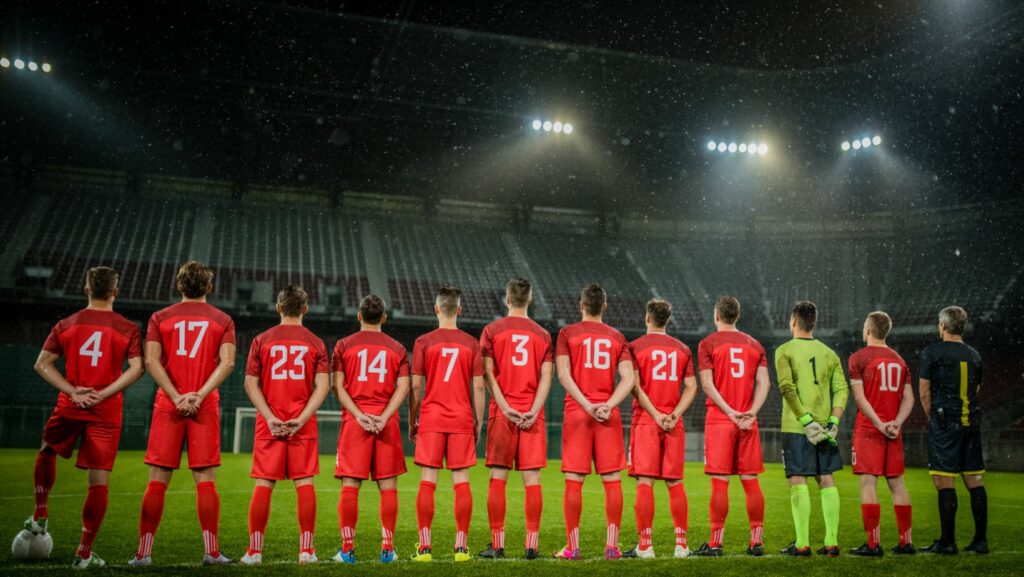A strong football team culture can make or break a season. It shapes how players interact with one another and influences their performance on and off the field. From camaraderie to discipline, the values instilled within a team can lead to extraordinary success or dismal failure.
Football Team Culture
Football team culture defines the environment that influences player behavior and performance. Strong cultures emphasize values such as trust, communication, and accountability, creating unity among team members. Cohesion among players fosters collaboration on the field, improving teamwork and strategies.
Key Elements of Football Team Culture
-
 Leadership
Leadership
Leadership shapes the team’s identity. Strong leaders inspire and guide, setting expectations for conduct and performance. -
Communication
Open lines of communication encourage feedback and facilitate understanding. Teams that prioritize dialogue enhance their ability to adapt during games. -
Camaraderie
Building friendships off the field fosters loyalty and support among players. Solid relationships encourage players to perform at their best. -
Discipline
Adherence to rules and expectations fosters respect within the team. Discipline in practice and game situations leads to consistent results. -
Inclusivity
Welcoming diversity promotes a broader range of perspectives. Teams that embrace inclusivity often cultivate innovation and creativity in play. -
Shared Goals
Aligning individual ambitions with team objectives creates a common purpose. Players committed to the team’s vision enhance motivation and focus.
Impact on Performance
 Culture contributes directly to a team’s performance level. High-functioning cultures minimize conflicts, streamline decision-making, and boost morale. Studies consistently show that teams with strong cultures outperform those without, demonstrating that cultural dynamics can significantly influence sporting outcomes.
Culture contributes directly to a team’s performance level. High-functioning cultures minimize conflicts, streamline decision-making, and boost morale. Studies consistently show that teams with strong cultures outperform those without, demonstrating that cultural dynamics can significantly influence sporting outcomes.
-
Establish Core Values
Define essential values and principles that guide the team’s behavior and decision-making processes. -
Encourage Team-Building Activities
Engage players in off-field activities that promote bonding, such as retreats or community service events. -
Set Clear Expectations
Clearly define roles and responsibilities to create a sense of accountability among players. -
Foster Feedback Loops
Create opportunities for players to provide input on team operations, promoting a culture of continuous improvement. -
Celebrate Achievements
Recognize individual and team accomplishments to boost morale and reinforce the importance of collaboration.
By focusing on these elements, football teams can cultivate a culture that enhances overall performance and prepares players to face challenges effectively.
Key Elements of Team Culture
Effective team culture hinges on several key elements that directly impact player dynamics and performance. Below are critical aspects of team culture that contribute to a successful football environment.
Leadership and Coaching Influence
 Leadership defines team culture. Coaches set the tone through their values and behaviors. Strong leaders inspire players, instill confidence, and foster a sense of belonging. They model accountability and resilience, emphasizing the importance of effort and persistence. A coach’s strategic vision directs team focus, encouraging players to align their individual goals with collective ambitions. Engaged leaders maintain open-door policies, allowing team members to voice concerns and ideas, which cultivates trust and enhances cohesion.
Leadership defines team culture. Coaches set the tone through their values and behaviors. Strong leaders inspire players, instill confidence, and foster a sense of belonging. They model accountability and resilience, emphasizing the importance of effort and persistence. A coach’s strategic vision directs team focus, encouraging players to align their individual goals with collective ambitions. Engaged leaders maintain open-door policies, allowing team members to voice concerns and ideas, which cultivates trust and enhances cohesion.
Communication within the Team
Communication serves as the backbone of a robust team culture. Open, honest dialogue between players and coaches promotes transparency and fosters collaboration. Regular team meetings and feedback sessions encourage members to express thoughts and resolve conflicts constructively. Clear communication enhances tactical understanding and prepares players for in-game adjustments. By emphasizing active listening and mutual respect, teams strengthen bonds and create an environment where everyone feels valued and understood. This foundation leads to a more cohesive unit on and off the field.
Building a Strong Team Culture
 A thriving football team culture is essential for achieving lasting success. It creates an environment where players feel valued and motivated to perform at their best. By prioritizing strong leadership and open communication, teams cultivate trust and unity among members.
A thriving football team culture is essential for achieving lasting success. It creates an environment where players feel valued and motivated to perform at their best. By prioritizing strong leadership and open communication, teams cultivate trust and unity among members.
Emphasizing shared goals and inclusivity fosters a sense of belonging that can enhance performance on and off the field. As teams invest in building relationships and celebrating achievements, they develop resilience and adaptability to face challenges.
Ultimately, a well-defined culture not only enhances player interactions but also drives teams toward excellence, making it a crucial element for any football organization aiming for greatness.

